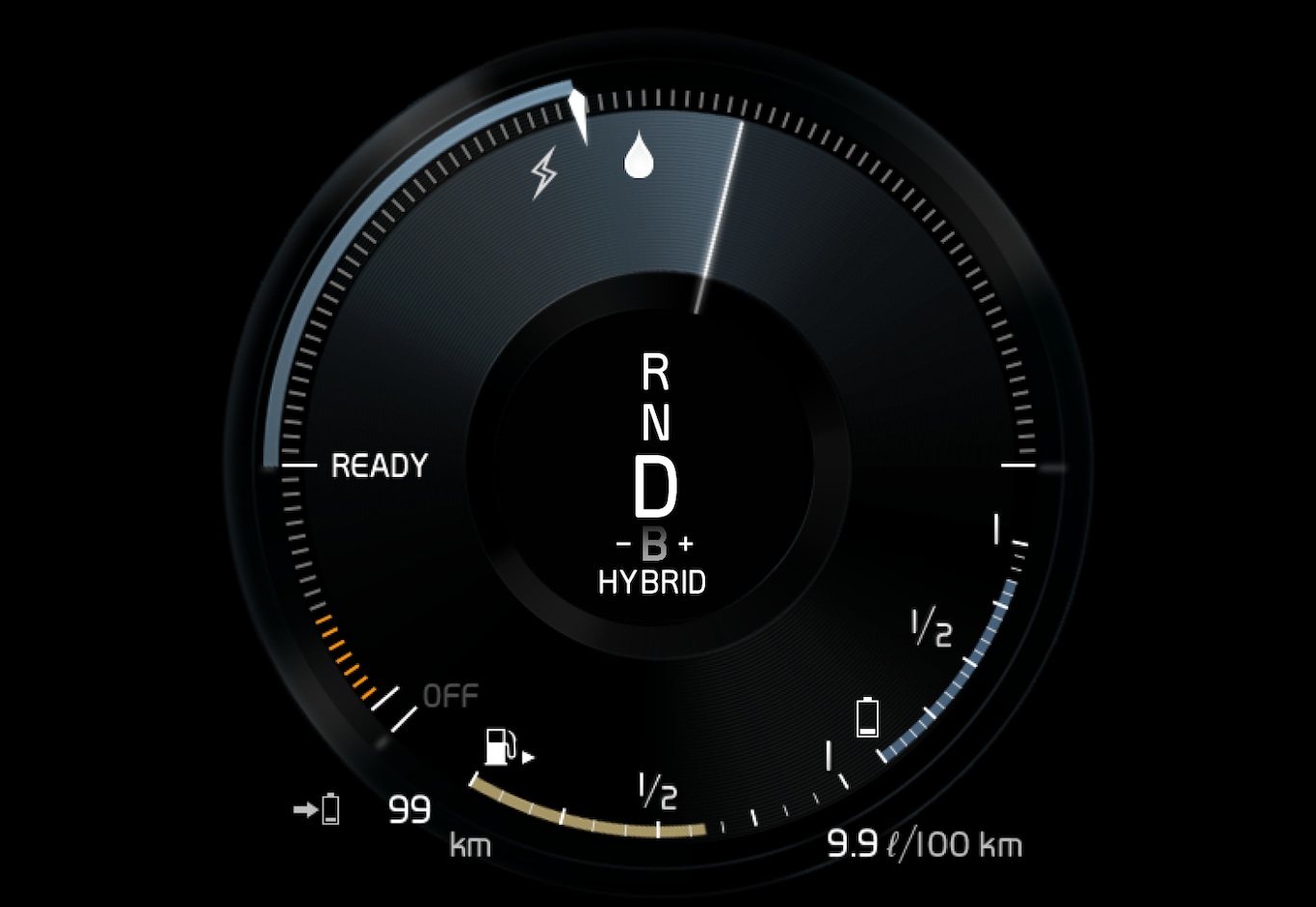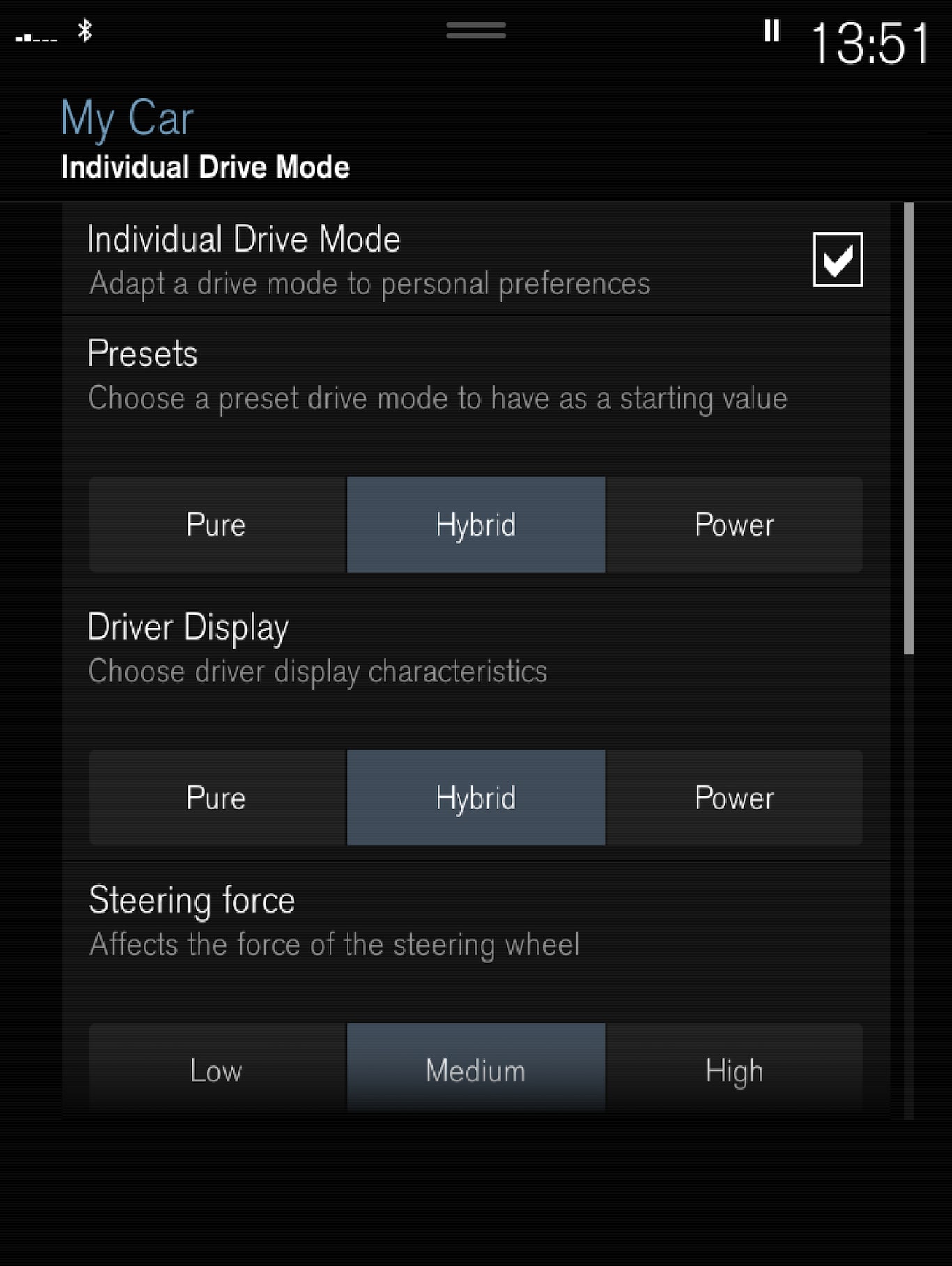Drive modes enable easy access to the vehicle's many functions and settings in different driving situations. Each drive mode is adapted to help optimize driving characteristics.
- Steering
- Engine/transmission/all-wheel drive
- Brakes
- Pneumatic suspension* and shock absorbers
- Instrument panel
- Climate control settings
Select the drive mode that is adapted to the current driving conditions. Keep in mind that not all drive modes are available in all situations.
Available drive modes
Warning
Warning
Hybrid
- This is the default mode in which the electric motor and combustion engine work together.
The vehicle starts in Hybrid mode. The control system uses both the electric motor and the gasoline engine – separately or in tandem – and adapts utilization with regard to performance, fuel consumption and comfort. At high speeds, ground clearance is automatically lowered1 to reduce air resistance. Driving capacity on the electric motor alone is determined by factors such as the hybrid battery's charge level, the need for heat or cooling in the passenger compartment, etc.
If there is sufficient charge in the battery, it is possible to drive solely on electric power. When the accelerator pedal is pressed, only the electric motor will be activated until the battery reaches a certain charge level. Above this level, the current in the battery cannot supply the power requested by the accelerator pedal and the combustion engine will start.
When the hybrid battery's charge level is low, the combustion engine will start more frequently to save the remaining current in the battery. Charge the hybrid battery from a 120-240 volt outlet using a charging cable, or activate Charge in Function view to reset the option of only using the electric motor.
This drive mode is designed for low energy consumption with a mix between the electric motor and gasoline engine, without compromising on climate comfort or driving experience. When faster acceleration is requested by the driver, the electric driveline will be utilized to help provide maximum additional power.
The vehicle also monitors the driving conditions and automatically engages all-wheel drive if necessary. All-wheel drive and extra electric power are always available regardless of the battery's charging status.
Information in the instrument panel
When driving in Hybrid mode, a hybrid gauge will be displayed in the instrument panel. The gauge will indicate the amount of electrical current required when the driver depresses the accelerator pedal. The marker between the lightning and the drop shows how much current is available.


The instrument panel also shows how much current is being restored to the battery (regenerated) during light braking.
Pure
- Uses the electric motor only, with the lowest possible energy consumption and carbon dioxide emissions.
This drive mode prioritizes the use of the hybrid battery. Ground clearance is lowered1 to reduce air resistance and certain climate system functions are reduced to provide the longest possible driving distance using only electricity.
Pure mode is available when the hybrid battery is sufficiently charged. Even in Pure mode, the combustion engine will start if the charge level in the battery gets too low. The combustion engine will also start
- if the vehicle's speed goes above 125 km/h (78 mph)
- if the driver requests more power than the electric motor can provide
- if factors such as cold weather affect the system or components.
This drive mode is adapted for the longest possible driving distance with electric propulsion and is primarily intended for use in city driving. Pure helps provide the lowest possible consumption even when the hybrid battery is fully discharged. ECO climate is activated to control the climate in the passenger compartment, and in slippery road conditions slightly more wheel spin may be permitted before all-wheel drive is automatically activated.
ECO Climate
In Pure mode, ECO climate is automatically activated in the passenger compartment to help reduce energy consumption.
Note
If condensation forms on the windows, tap the max defroster button, which will function normally.
Off Road
- Prioritizes the vehicle's ability to traverse difficult terrain or poor roads.
In this mode, ground clearance1 is high, steering is light, and all-wheel drive and Hill Descent Control are activated.
This drive mode is only available at low speeds, up to 40 km/h (25 mph). If this speed is exceeded, Off Road mode will be cancelled and Constant AWD mode will be activated instead.
All-wheel drive requires both the combustion and electric motor to be in continuous operation, which results in higher fuel consumption.
In Off Road mode, a compass will be displayed between the speedometer and the tachometer in the instrument panel. The permissible speed range will be shown in the speedometer.
This drive mode is adapted for optimal control when driving at low speeds on very poor roads or difficult terrain. It raises the chassis1, reduces driveline throttle response, and locks the vehicle in all-wheel drive. The Hill Descent Control function facilitates controlled driving on steep downgrades.
Note
Note
Important
Constant AWD
- Improves the vehicle's traction and handling by increasing all-wheel drive.
This drive mode locks the vehicle in all-wheel drive. An adapted distribution between front and rear axle torque provides effective control, stability and traction, e.g. on slippery roads or when towing a heavy trailer or another vehicle. The Constant AWD drive mode is always available regardless of the hybrid battery's charge status.
Both the combustion engine and the electric motor are engaged to enable all-wheel drive, which results in higher fuel consumption.
In the other drive modes, the vehicle automatically adapts the need for all-wheel drive according to the road surface, and can activate the electric motor or start the combustion engine as needed.
Power
- The vehicle gets sportier driving characteristics and a faster acceleration response.
This drive mode adapts the combined power from the combustion engine and the electric motor by providing power to both the front and rear wheels. Gear shifting will be faster and more distinct and the transmission will prioritize gears with a higher traction force. Steering response is faster, suspension is stiffer and ground clearance is lower1 to help reduce body roll when cornering.
Both the combustion engine and the electric motor are engaged to enable all-wheel drive, which results in higher fuel consumption.
This drive mode is adapted for optimal performance and response during acceleration. It changes the throttle response, gear shifting program and turbo boost system. Chassis settings and steering and brake response are also optimized. The Power drive mode is always available regardless of the hybrid battery's charge status.
Power mode is also available in a Polestar Engineered* version.
Individual
- Customizes drive mode to personal preferences.
Select one of the drive modes as a basis and adjust the settings to achieve your preferred driving characteristics. These settings will be stored in your driver profile.
Individual drive mode is only available if it has been activated in the center display.

Under Presets, select one of the following drive modes as a basis: Pure, Hybrid, Power or Polestar Engineered*.
The following settings can be modified:
- Driver Display
- Steering Force
- Powertrain Characteristics
- Brake Characteristics
- Suspension Control
- ECO Climate
Using the electric or combustion engine
An advanced control system determines the distance that the vehicle can be driven on the combustion engine, electric motor, or both at the same time.
Its primary function is to use the motor/engine and the current available in the hybrid battery as efficiently as possible based on the characteristics of the various drive modes and the power output requested by the driver by pressing the accelerator pedal.
In certain cases, temporary limitations in the system or mandatory functions to help maintain a low overall emissions level may result in greater use of the combustion engine.